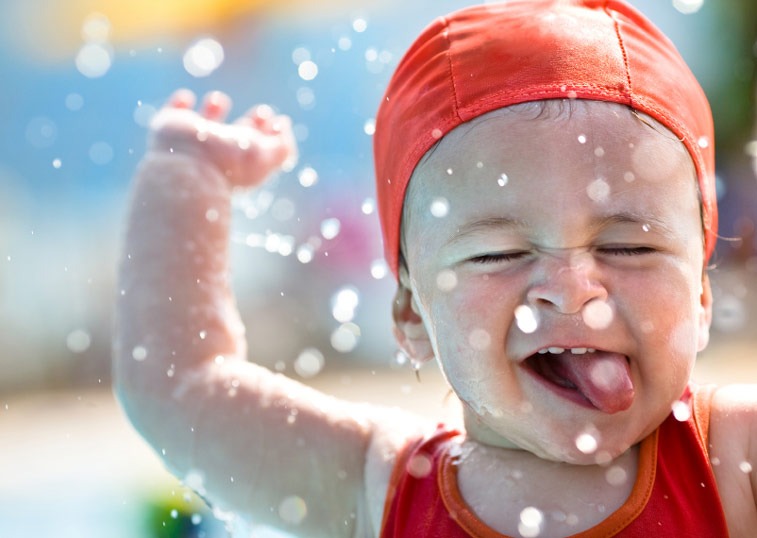Once temperatures warm, you want to get the family outside as much possible before the seasons change again. But before you head outdoors, remember your baby needs a little extra TLC to stay safe in the summer.
Sunscreen for babies
Sunscreen is recommended for everyone, right? While children and adults should always protect themselves with sunscreen, it is not recommended for babies under 6 months old. Keeping your infant in the shade is the better choice and, particularly, between 10 a.m. and 2 p.m. when ultraviolet rays are the most intense.
Because infants have a higher surface-area to body-weight ratio than older children and because baby skin is less mature, their exposure to chemicals in sunscreens may be much greater. That can increase the risk of side effects from sunscreen.
Preventing sunburn
Plan ahead by covering up your infant. To prevent sunburn, dress your baby in lightweight long pants, long-sleeved shirts and hats. Choose clothes with tight weaves. If you hold the fabric against your hand, it shouldn’t be so sheer you can see through it. Use brimmed hats, which shade the neck, rather than cute baseball caps or headpieces that provide no cover for the neck and ears.
Of course, it isn’t always possible to keep your baby totally covered and in natural shade. Instead you can create your own shade by using an umbrella, canopy, blanket or even your body to protect your baby.
If you are in a situation where there is no possible shade, apply a small amount of sunscreen with a sun protection factor (SPF) of at least 15 to small areas that are likely to be exposed. Avoid combination sunscreens that contain insect repellents like DEET. Try testing your baby’s sensitivity to sunscreen by rubbing a small amount on the inner wrist first and waiting a few minutes.
Heat and baby health
Sun isn’t the only factor from which your baby needs protection. The hot, humid days of summer affect babies more intensely than adults.
Infants don’t sweat like adults do. Sweat naturally cools down an adult, but babies haven’t developed that advantage yet.
Babies are also at higher risk of dehydration. Bring a cooler to store liquids and make sure your baby gets regularly scheduled feedings of breastmilk or formula. The water content will help your infant stay hydrated.
Pay attention to your baby’s signals. Fussiness, redness and excessive crying may indicate too much sun or heat. If your baby’s urination is less than usual, it can be a sign of dehydration. If your baby starts to become sunburned, get out of the sun immediately. Apply cold compresses to sunburned areas of the skin.
Remember that your baby is more susceptible to the dangers that can accompany summertime’s scorching sun and high temperatures. But there is also plenty of time for fun. With just a little planning and preparation, you can keep your baby safe, cool, hydrated and happy all summer long. If you have any concerns or questions, please talk to your child’s primary care provider.
Learn more
- Look in back before you lock your car — every time
- Keep your family cool and safe in the summer heat
- Water safety tips keep kids water smart
…
Posted In Children's, Health Information, Healthy Living, Parenting
